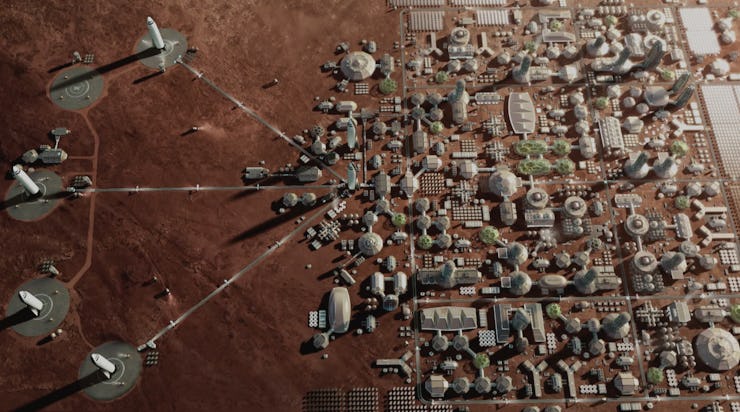A new study has poured cold water on Elon Musk’s plan to terraform Mars, but the SpaceX CEO isn’t going down without a fight. On Tuesday, Musk pushed back against a news article that claims there isn’t enough carbon dioxide available on the red planet to theoretically create an atmosphere with comparable pressure to Earth.
The study, published in the journal Nature Astronomy on Monday and reported in Discover Magazine, considered two approaches to transforming Mars into a livable planet. One involves raising Mars’ atmospheric pressure until humans only need to use a small breathing apparatus, while the other involves creating an atmosphere where liquid water can exist on the surface and humans can ditch the breathing gear. Unfortunately, Bruce Jakosky of the University of Colorado Boulder and Christopher S. Edwards of Northern Arizona University found there’s not enough carbon dioxide to support either plan, with Mars’ total stores amounting to just 15 millibars of pressure — well below the 1,000 millibars found at Earth’s sea level. Destroying the planet’s sedimentary rocks, created while Mars was wet, would only release 12 millibars. Musk dismissed these conclusions on Twitter.
See more: New Study Regrets to Inform You We May Never Terraform Mars*
Musk has spoken before about his dream to terraform Mars and elevate humanity to a “multi-planetary species.” His June 2017 article in the journal New Space claimed Mars is a better candidate for colonization than the moon because it has an atmosphere, more natural resources, and a 24.5-hour day compared to the moon’s 28-day day. Warming Mars up would create “a thick atmosphere and liquid oceans.” Musk claimed in 2015 that humans could heat up Mars with artificial pulsing suns above the poles to encourage climate change. Another idea floated by Musk is to simply nuke the planet.
Scientists have dismissed terraforming planets before, though. A March 2017 study in the journal Science used data from the Mars Atmosphere and Volatile Evolution (MAVEN) mission to conclude the planet’s atmosphere is severely lacking in carbon dioxide and other gases. Co-author Bruce Jakosky told Inverse at the time of the study’s publication that the finding “really kills the idea of terraforming, unless maybe we can import some gas [from Earth].”
None of this is likely to put Musk off his next immediate Mars goal, which is to send two spaceships with supplies to the red planet by 2022. This would lay the groundwork for four rockets in 2024, two of which will send the first humans to Mars.
Whether the humans will pave the way for a terraformed second planet is another debate.
